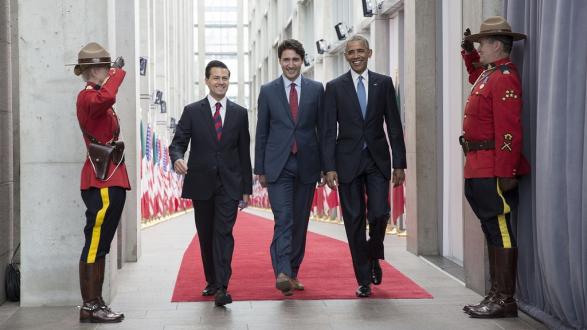In:
Global Beat is your weekly stop for news from around the world. Join us every Friday morning for important stories you should know about.
This week, North American nations make a massive clean power pledge; Turkey reels from a terrorist attack on Istanbul's Atatürk Airport; the Iraqi military pushes the Islamic State out of Fallujah; and more.
____________________
Americas
The United States, Mexico, and Canada convened this week in Ottawa for a "Three Amigos" conference, where the countries pledged to use sustainable power for half of their combined electricity needs by the year 2025. Increased support for renewable energy resources, such as hydropower, solar, and nuclear sources, as well as strengthening carbon capture and storage processes, can help the North American nations achieve this "aggressive target." Currently, Canada leads the pack in sustainable energy production, with 81 percent of its electricity derived from clean energy.
Also check out:
- Canada offers Mexico visa-free travel in exchange for chance to sell it more beef – Josh Wingrove, Bloomberg
Central & South Asia
Fifty Muslim clerics in Lahore, Pakistan, issued a surprising fatwa supporting the right of transgender people to get married. The fatwa also asserts that any acts of hatred and intolerance perpetrated against transgender people should be conceived as criminal behavior. While the ruling helps shift Pakistani society in a direction of acceptance, there is still a ways to go to secure full legal rights for the transgender community and other marginalized groups. In recent years transgender people in Pakistan have struggled to find employment and face major prejudice. Meanwhile, same-sex marriage has not been legalized and women’s rights remain limited.
Also check out:
- India goes from village to village to compile world’s largest ID database – Vidhi Doshi, The Guardian
China & East Asia
China severed communications with Taiwan this week over a disagreement on the “one China” concept, an accord reached between China’s Communist Party and Taiwan’s Kuomingtang party in 1992. Taiwan’s recently elected leader, President Tsai Ing-wen, refuses to recognize that there is “one China” uniting mainland China and Taiwan, therefore sparking the Chinese government to cut off contact. It is unclear whether contact will be restored in the near future.
Also check out:
- Japan’s 70-year-old child welfare law finally overhauled after UN warnings – Alice Wheatley, International Business Times
Europe & Russia
Forty-two people were killed and 239 people were injured Tuesday by three suicide attackers at Istanbul’s Atatürk airport. Analysts posit that ISIL is responsible, and wonder if there is a connection to Turkey’s recent diplomatic efforts to restore ties with Israel and Russia.
In recent months, Istanbul has unfortunately become the site of numerous terrorist attacks. In March 2016, a suicide bomber killed and injured tourists and locals in one of the city’s densest areas. Ankara, Turkey’s capitol, suffered a bombing attack this past month undertaken by the TAK, a Kurdish group.
Also check out:
- UN General Assembly elects Sweden, Bolivia, Ethiopia, and Kazakhstan as new non-permanent members to the Security Council, with Italy and the Netherlands agreeing to share the fifth seat – Margaret Besheer, Voice of America
Middle East & North Africa
Fallujah, the Iraqi city held since January 2014 by ISIL fighters, has finally been liberated. Iraqi forces announced this week that they have retaken the hotly contested territory. The battle lasted five weeks and its success is significant as Daesh used Fallujah as an operations base to launch their reign of terror in Iraq. The conflict has caused a major displacement of city residents, with many civilians in the direct path of hostilities. Mosul, another major Iraqi city, is still held by the Islamic State.
Also check out:
- Morocco, Portugal determined to lift cooperation to higher levels – The North Africa Post
Southeast Asia & Oceania
China and Vietnam agreed to improve cooperation between their respective coast guards despite their competing territorial disputes in the South China Sea. The agreement was signed during a trip to Vietnam on Monday by State Councilor Yang Jiechi, China’s top diplomat. Meanwhile, China continues to rebuke the Hague-based Permanent Court of Arbitration, which announced this week that it will issue a ruling on July 12 in the Philippines’ case against China over its own territorial disputes in the South China Sea.
Also check out:
- Timor-Leste: Australia is behaving like China in disputed waters – Dan De Luce, Foreign Policy
Sub-Saharan Africa
Gearing up for local elections this August, South Africa has been rocked by turmoil in the form of electoral riots and protests. Across the nation in cities like Pretoria and Durban, South Africans are protesting candidates and expressing frustration with party policies. These demonstrations have often turned violent. Some analysts are drawing parallels to the 2007 election season in Kenya, where 1,200 people died as a result of election-related violence. The violence is uncharacteristic in South Africa; the country is generally lauded for its typically calm democratic process.
Also check out:
- Women’s rights groups in Niger push forward on gender equality – Kim Yi Dionne and Alice Kang, Washington Post




